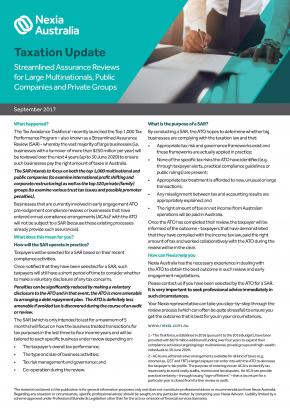What happened?
The Tax Avoidance Taskforce1 recently launched the Top 1,000 Tax Performance Program – also known as a Streamlined Assurance Review (SAR) - whereby the vast majority of large businesses (i.e. businesses with a turnover of more than $250 million per year) will be reviewed over the next 4 years (up to 30 June 2020) to ensure such businesses pay the right amount of taxes in Australia.
The SAR intends to focus on both the top 1,000 multinational and public companies (to examine international profit shifting and corporate restructuring) as well as the top 320 private (family) groups (to examine various trust tax issues and possible promoter penalties).
Businesses that are currently involved in early engagement ATO pre-lodgement compliance reviews or businesses that have entered annual compliance arrangements (ACAs)2 with the ATO will not be subject to a SAR (because these existing processes already provide such assurances).
What does this mean for you?
How will the SAR operate in practice?
Taxpayers will be selected for a SAR based on their recent compliance activities.
Once notified that they have been selected for a SAR, such taxpayers will still have a short period of time to consider whether to make a voluntary disclosure of any tax concerns.
Penalties can be significantly reduced by making a voluntary disclosure to the ATO and in that event, the ATO is more amenable to arranging a debt repayment plan. The ATO is definitely less amenable if avoided tax is discovered during the course of an audit or review.
The SAR (which is only intended to last for a maximum of 5 months) will focus on how the business treated transactions for tax purposes in the last three to four income years and will be tailored to each specific business under review depending on:
- The taxpayer’s overall tax performance;
- The type and size of business activities;
- Tax risk management and governance; and
- Co-operation during the review.
What is the purpose of a SAR?
By conducting a SAR, the ATO hopes to determine whether big businesses are complying with the taxation law and that:
- Appropriate tax risk and governance frameworks exist and these frameworks are actually applied in practice;
- None of the specific tax risks the ATO have identified (e.g. through taxpayer alerts, practical compliance guidelines or public rulings) are present;
- Appropriate tax treatment is afforded to new, unusual or large transactions;
- Any misalignment between tax and accounting results are appropriately explained; and
- The right amount of tax on net income from Australian operations will be paid in Australia.
Once the ATO has completed their review, the taxpayer will be informed of the outcome - taxpayers that have demonstrated that they have complied with the income tax law, paid the right amount of tax and worked collaboratively with the ATO during the review will be in the clear.
How can Nexia help you?
Nexia Australia has the necessary experience in dealing with the ATO to obtain the best outcome in such review and early engagement negotiations.
Please contact us if you have been selected by the ATO for a SAR. It is very important to seek professional advice immediately in such circumstances.
Your Nexia representative can take you step-by-step through the review process (which can often be quite stressful) to ensure you get the outcome that is best for you in your circumstances.
1 - The Taskforce, established in 2016 (pursuant to the 2016 Budget), have been provided with $679 million additional funding over four years to expand their compliance activities targeting large multinational, private groups and high-wealth individuals to 30 June 2020.
2 - ACAs are administrative arrangements available for all kind of taxes (e.g. income tax, GST and FBT) a large taxpayer can enter into with the ATO to decrease the taxpayer’s risk profile. The purpose of entering into an ACA is to identify tax issues early to avoid costly audits, reviews and tax disputes. An ACA can provide practical certainty – through issuing “sign-off letters” – that a tax return for a particular year is closed from further review or audit.


